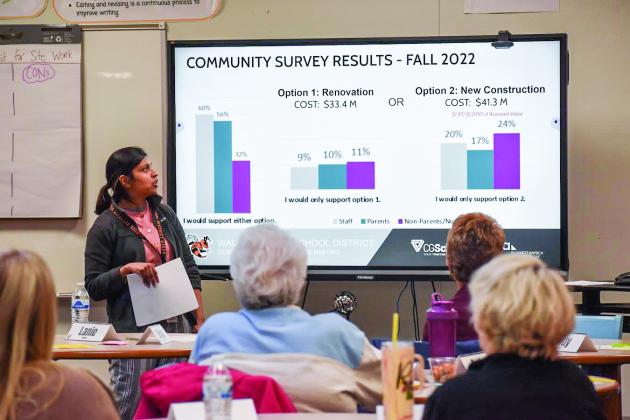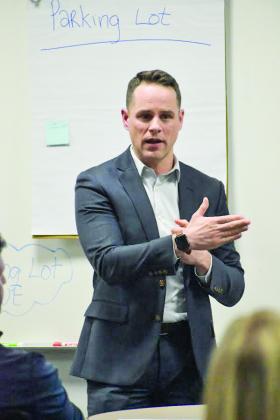Image
Body
Members of the Wautoma Area School District (WASD) Ad Hoc Community Impact Committee stepped back into the classroom to learn about school finances and how districts are funded in the State of Wisconsin from WASD Chief Financial Officer Carmen O’Brien and Baird Vice President Jordan Masnica at their third CIC Meeting on March 18 at Parkside School.
During the presentation, O’Brien explained that a referendum is a ballot question to ask the electors to exceed the school district revenue limit that is established by the State of Wisconsin. She also explained there are two types of referendum questions, including: Operational, which provides additional revenue to use to pay for operations such as utilities, routine maintenance, salaries and benefits for staff, insurance and supplies; and Capital, which issues debt for a specific purpose such as constructing a new building.
Following O’Brien’s overview, Masnica spoke to the CIC about school district revenue limits and the maximum amount of revenue that may be raised by a school district through state general aid and property taxes. He stated that the mill rate for the WASD is currently set at $5.71 for 2024, which equates to $571 for each $100,000 in home valuation, which is far lower than the state average of $722 per $100,000 of home valuation.
Masnica also provided the CIC a breakdown of what the tax impact could be for three separate possible capital referendum amounts as well as the impact for $100,000, $200,000, and $300,000 homes. Based on the preliminary numbers for construction of a new school, Masnica said a $40 million referendum would increase the mill rate by $1.81; a $45 million referendum would increase the mill rate $2.05; while a $50 million referendum would increase the mill rate $2.30.
At the conclusion of his presentation, Masnica shared with the committee the results of the most recent school referenda from some surrounding communities along with information regarding which have passed and which have failed. He also provided a map of the 10 year history of referendums passed in the State of Wisconsin. Of the questions asked throughout Wisconsin in the past 10 years, 377 passed while 145 have failed. O’Brien added WASD has been constrained in their operating budget due to the revenue limit not keeping up with inflation. She said COVID relief, such as ESSER Funds, have helped but are set to expire in September 2024.
Prior to the School Finance 101 Presentation, CIC members were able to view the feedback the group gave during the February meeting regarding the recommendations the CIC felt should go to the school board. Twenty-five individuals felt a new “Riverview” on a different site would be their recommendation; two members felt that the district should address maintenance needs only at Riverview; and one felt a renovation at the current Riverview Site would be their recommendation. Based on this information, District Administrator Jewel Mucklin stated the results from the CIC were similar to the Community Survey Results the district received in the fall of 2022 before going to referendum in April 2023.
CIC members were given a tour of Parkside School and grounds by Devin Kack, a partner and architect from Plunkett Raysich Architects, LLP (PRA), Parkside Principal Doug Beattie, Mucklin, and CG Schmidt Project Manager Justin Johnson. The tour was provided in response to the feedback received from the previous CIC meetings as many community members wanted to learn more about the Parkside site.
Following the tour, Kack shared more information with the CIC regarding the two possible sites for a new elementary, including a new building on the Parkside School site and a new elementary school located on Taplin Drive. With location being a significant topic of interest, the team explored the Parkside site to determine if a two-story building approach was taken, could a new school on Parkside’s grounds be feasible?
Kack stated the Parkside site has about 35 acres and with a new elementary school there would be additional parking and playgrounds as well as a parent loop and bus loop. He explained Taplin Drive Site has about 21.6 acres and there would also be a dedicated parent loop at one side of the school, while the bus loop would be at the other end of the school. Kack added the Taplin Site would have staff parking, visitor parking, playgrounds, and there is the opportunity to expand.
Following Kack’s explanation of the two sites, PRA Director of Education Strategy, Melissa Thompson, had the CIC make a list of pros and cons for each site in order for the district and Board of Education to see the committee’s opinions at each site. The members provided input on: cost of site work; safety; traffic flow; greenspace/play areas; parking; operations/overall management; human resources/staffing; teaching and learning; and the student experience.
Next, Mucklin and Kack spoke about safety and security at each school, which not only includes building security but also access to materials, technology, and the physical environment; public accommodations that need to be barrier free; as well as the layers of protection, including district, school, classroom, and community levels.
At the conclusion of the meeting, Mucklin spoke to the CIC about the upcoming Community Conversations scheduled on April 17th and May 8th. She encouraged the members of the CIC to come to the events with the first one being held at Riverview Elementary School starting at 6 P.M. These conversations will be about future facility planning, with the opportunity for community members to tour Riverview Elementary School and ask questions and provide feedback to the district.
For more information about the Wautoma Area School District Community Impact Committee Meetings as well as Facility Planning, visit www.wautomasd.org.



